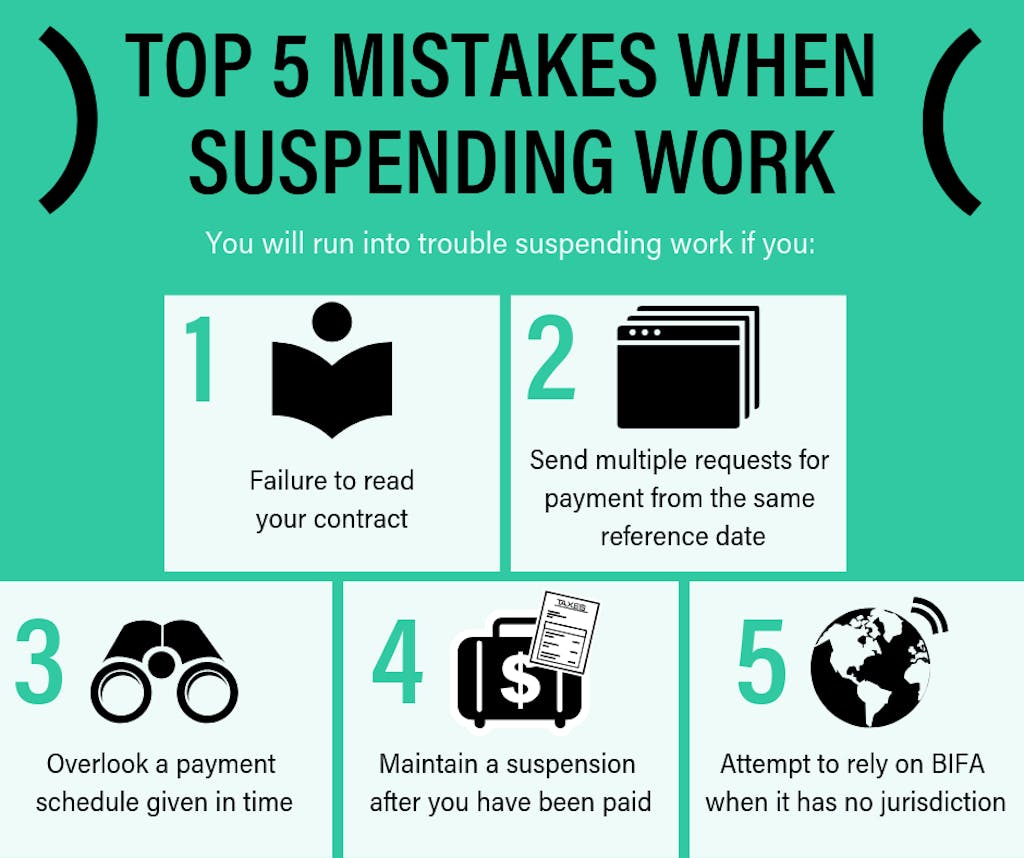The BIFA Right to Suspend
In the highly competitive construction industry, no matter your size or the value of your contract, it is common to be asked to enter into the bespoke tier one builder’s contract in order to be awarded work. With limited bargaining power in contract negotiations, even very specialist subcontractors, generally have limited scope but to agree to terms that are drafted specifically for the benefit of the other party.
A clause that we often see limiting subcontractors’ rights when reviewing these bespoke contracts is in relation to the right to suspend the works. It is more common than not in bespoke contracts that the subcontractor will have no entitlement to suspend the progress of the works except where it is directed by the contractor. Consequently, the subcontractor holds no power to refuse to proceed with works, even in circumstances where they are unpaid.
If a subcontractor hasn’t been paid, it will likely want to cease the performance of future works until the amount in dispute is paid or the matter is otherwise resolved. A direction by a head contractor to a subcontractor to suspend in such circumstances is fanciful. Nonetheless, to expend further resources with the increased risk of non-payment makes little commercial sense to operators small and large within the construction industry. So, if the contract only provides for a right to suspend works upon the direction of a head contractor, is a subcontractor required to continue the works even if it hasn’t been paid for its previous claim?
The answer lies in section 38 of the Building Industry Fairness (Security of Payment) Act 2017 (BIFA), which provides a subcontractor claimant with a statutory right to suspend the works it was performing under a construction contract. Subject to the BIFA suspension right being properly exercised, the subcontractor claimant (who has an unhelpful contract) is precluded from being liable to the head contractor respondent for any loss or damage it suffers.
However, is vital that the legislative steps are satisfied before proceeding to suspend works as there is a significant risk of an unlawful suspension attracting the liability for any additional costs the suspension causes.
Before proceeding to exercise an SOP suspension right the following requirements must be considered:
1. Has a valid payment claim been served upon the respondent?
Under BIFA, most documents that claim a value for particularised construction work are likely to be considered a payment claim. However, in order to rely upon a suspension under BIFA, the payment claim must be validly served in accordance with the legislative requirements, including being the only payment claim served for the relevant reference date. This may be more complicated than most would initially expect because now there is a much wider scope of what may be considered a payment claim. A contractor may argue that you have no right to suspend as you have issued multiple documents on or from the reference date that it maintains are payment claims.
2. The respondent has not paid an amount owed in full on or before the due date.
An amount owed is:
- the amount claimed in the payment claim if the respondent did not respond with a payment schedule within time; or
- the amount proposed in the payment schedule if the respondent did respond with a payment schedule.
You should firstly consider the due date for payment provided within your contract. The contract will usually state the date that payment is to be made, however if it does not, BIFA provides a legislative due date being 10 business days after a payment claim is made. Carefully calculate and confirm that the due date for payment has passed with reference to both the contract and the legislation before considering a suspension of works.
Secondly, have you received a payment schedule? If so, the amount stated in that payment claim is relevant to the suspension as payment of the scheduled amount will preclude your lawful entitlement to do so. This is regardless of payment of the scheduled amount being significantly below that of your payment claim.
Finally, if you have not received a payment schedule, you should ensure that the amount of your payment claim has also not been paid. A potential administrative failure that causes you to suspend works in circumstances where the amount of the payment claim has actually been paid will result in an unlawful suspension. Of course, your legislative entitlement to suspend will be maintained if you have not been paid the amount of the payment claim and have not received a payment schedule within time.
3. Notice of intention to suspend has been served on the respondent and at least 2 business days have passed.
Prior to suspending works, the claimant must give notice of its intention to suspend the works under BIFA. It should be noted that certain additional days are excluded from the definition of business days under BIFA. Business days exclude the weekends, public holidays as well as the period between 22 December and 10 January. Before taking steps to suspend, consider whether the period includes any of these excluded days to ensure compliance with the notice provisions in the legislation.
4. Work is resumed within 3 business days of payment of the amount owed being received.
The right to suspend under BIFA ceases to exist following 3 business days of payment being received. You should monitor your accounts because if payment is made failure to resume work may lead to financial consequences for the subcontractor.
It follows that there are options available for subcontractors regardless of the limited rights within the contract. Before any SOP suspension, absolute compliance with BIFA should be confirmed. You must be sure that your statutory rights have been enlivened.




